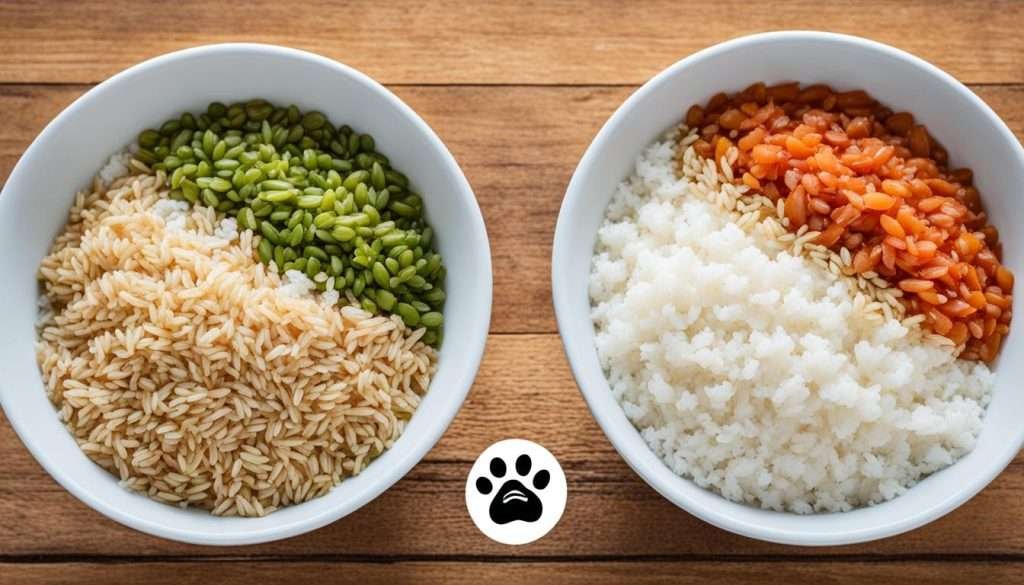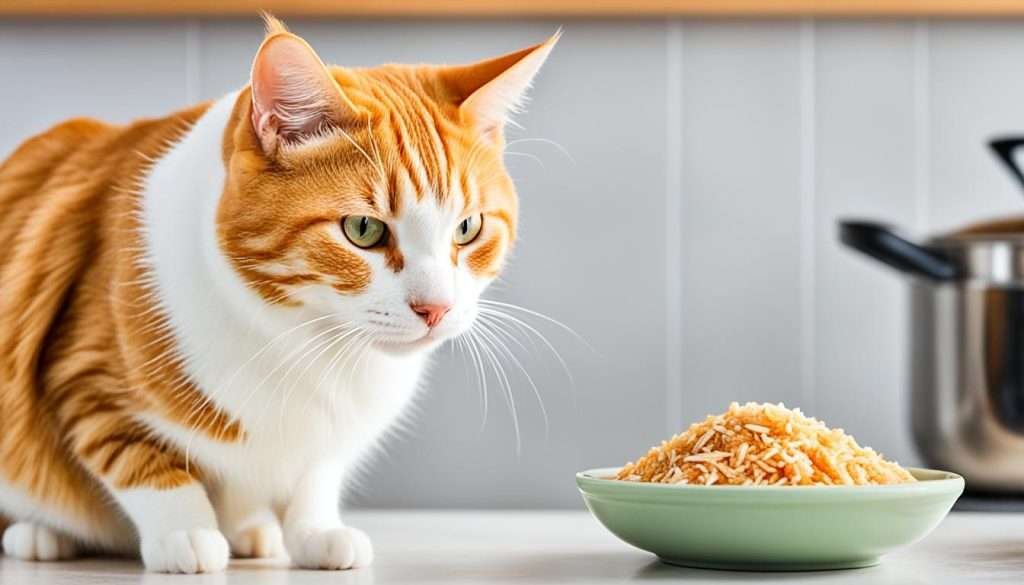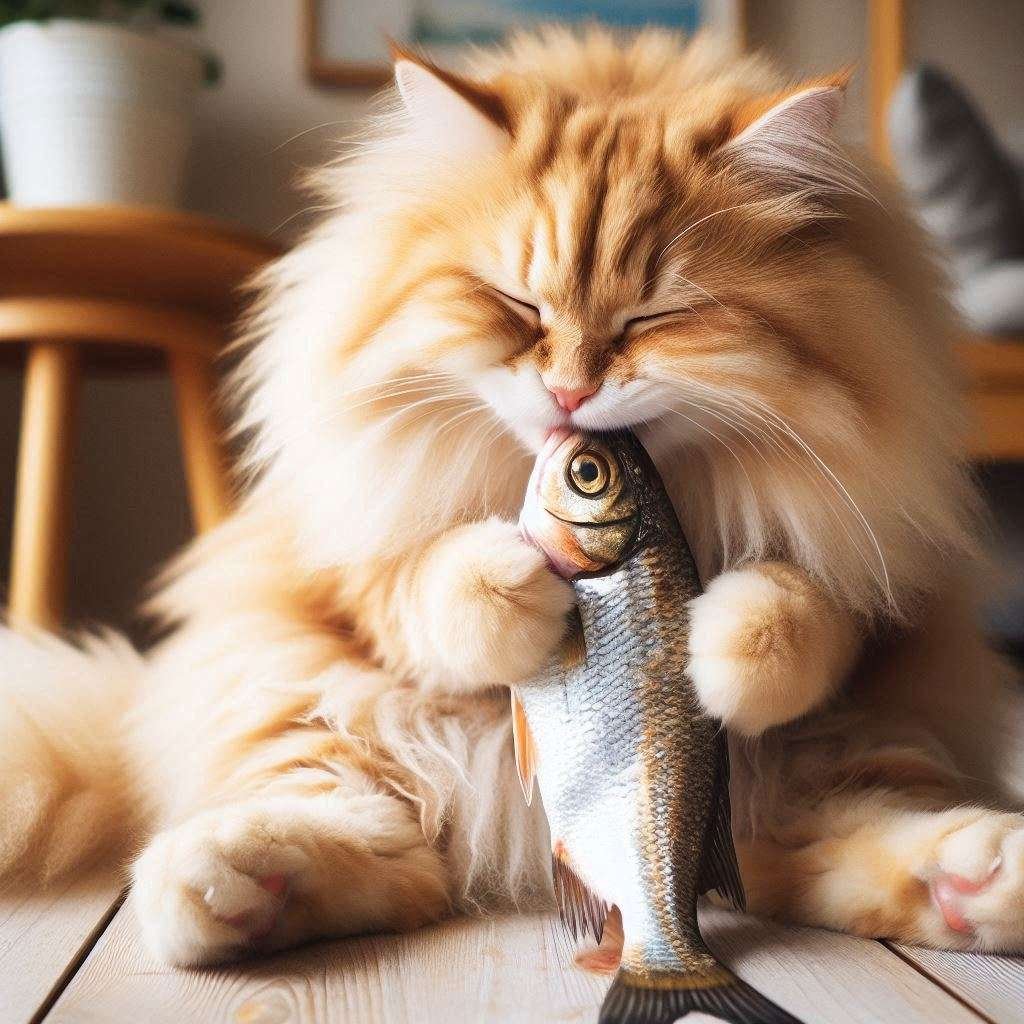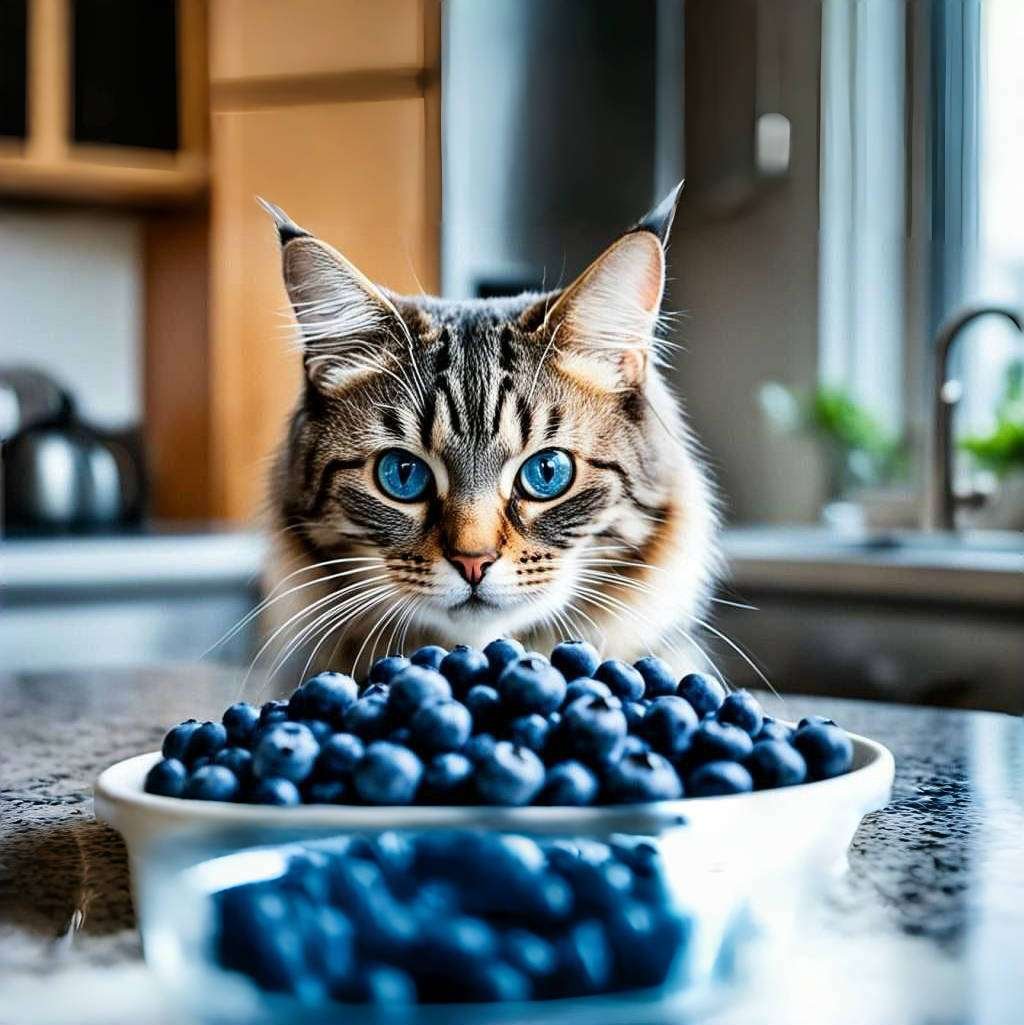Can cats eat rice? cats need a special diet because they are obligate carnivores. Many people wonder if cats can eat rice. This article looks at the good and bad of giving rice to cats, and how to do it right.
Cats are meant to eat a lot of protein and nutrients from meat. Rice isn’t bad for cats, but it’s not good for them either. Eating too much can make them overweight and lead to health problems like diabetes.

Key Takeaways
- Cats can eat rice in small amounts, but it is not an essential part of their diet.
- Brown rice is higher in fiber and may be recommended by vets for cats with digestive issues.
- Commercial cat foods may contain grains like rice, but cats do not require carbohydrates as obligate carnivores.
- Excessive rice consumption can lead to obesity and related health problems in cats.
- Uncooked rice should never be fed to cats as it is hard to digest and may contain a natural pesticide.
The Question: Can Cats Eat Rice?
Cats are different from humans in what they need to eat. They can eat a little rice, but it’s not key to their diet. Let’s look into why cats can eat rice but it’s not a must-have.
Understanding a Cat’s Dietary Needs
Cats need animal proteins to live. They can’t use carbs like rice well. In the wild, cats eat mostly meat, with little plant stuff.
The Nutritional Value of Rice for Cats
Rice is okay for cats in small amounts, but it’s not what they need. Cats need proteins, fats, and certain vitamins from meat, not rice. Too much rice can cause health problems like obesity and diabetes.
Some vets might say to add a bit of cooked rice to a cat’s diet for digestive issues. But, it should never take the place of meat in their diet. Meat gives cats the nutrients they really need.
“Cats are obligate carnivores, meaning their bodies are adapted to derive the majority of their nutritional requirements from animal-based proteins.”
White Rice vs. Brown Rice for Cats
Both white rice and brown rice are safe for cats in small amounts. But, there are differences to think about when adding them to a cat’s diet.
White Rice for Cats
White rice is easy for cats to digest because it’s less processed. It has fewer nutrients but is good for cats with stomach issues like diarrhea or vomiting. It’s a gentle food that can help calm a cat’s upset stomach.
Brown Rice for Cats
Brown rice for cats has more fiber, vitamins, and minerals than white rice. These nutrients can help with digestion and make a cat’s diet more balanced. But, some cats might find it harder to digest because of the higher fiber.
| Comparison | White Rice | Brown Rice |
|---|---|---|
| Digestibility | More easily digested | Harder to digest |
| Nutrient Content | Less nutritious | More nutritious |
| Fiber Content | Lower fiber | Higher fiber |
| Suitability for Digestive Issues | More suitable | Less suitable |
White rice for cats is better for cats with sensitive stomachs or digestive problems. Brown rice for cats is good for healthy cats because it’s more nutritious. Always introduce rice slowly and in small amounts to make sure your cat likes it.

“Cats are obligate carnivores, meaning they require certain nutrients found only in animal-based proteins to survive and thrive. While rice can be a safe occasional treat, it should not be the primary source of nutrition in a cat’s diet.”
Can Cats Eat Rice?
The Benefits and Risks of Feeding Rice to Cats
Rice is usually safe for cats in small amounts. But, it’s good to know the good and bad sides. Cats mainly eat meat because they are obligate carnivores. Yet, a little plain, cooked rice can ease their stomach during diarrhea or vomiting.
Rice has both pros and cons for cats. It gives them energy and some vitamins and minerals. But, cats need special nutrients like taurine and vitamin A from meat. Too much rice can make cats gain weight and cause health problems.
Moderation is Key: How Much Rice Can Cats Eat?
Experts say a bit of plain, cooked rice is okay for cats, but don’t overdo it. Cats should eat less than 35% carbs daily to avoid stomach issues. Rice should be a tiny part of their diet, with treats making up only 10%.
- Cats can have white rice, which is easy for them to digest.
- Brown rice is harder for cats to digest because of its bran layer.
- Avoid fried rice, rice pudding, rice krispies, and rice cakes as they can be harmful.
If a cat is sick, see a vet to find out what food is best. Always be careful and moderate when giving rice to cats.

Using Rice as a Remedy for Feline Digestive Issues
Cats need meat to survive, but sometimes, cooked rice can help with digestive problems. The fiber in rice makes stools firmer, which can help with diarrhea. It’s also easy on a cat’s stomach when they’re vomiting.
When Rice Can Help with Diarrhea and Vomiting
Cats with mild digestive issues might do better on a rice diet. The fiber absorbs extra moisture, making stools firmer. Rice is also kinder to their stomach, which can cut down on vomiting.
But remember, cats need a balanced diet for good health. Rice isn’t a long-term fix. If a cat keeps having digestive problems, see a vet to find out why and how to help.
Start with small, frequent meals of rice, gradually increasing the amount over a few days. A mix of cooked chicken and rice can be a nutritious option. This combo is high in protein and calories, helping the cat recover.
If the cat doesn’t like chicken and rice, try low-fat wet food. This can help with digestion and keep the cat healthy. Always watch how the cat reacts and talk to a vet if things don’t get better or get worse.
“Rice can be a temporary solution for cats with mild digestive issues, but it should not replace a balanced, veterinarian-approved diet.”
Safe Alternatives to Rice for Feline Snacks
Rice is okay for cats in small amounts, but there are better snacks out there. These snacks can give cats the nutrients they need. They are closer to what cats naturally eat.
Healthy Human Foods That Cats Can Eat
For cats, lean meats, cooked eggs, some veggies, and fruits are great. These foods are safe and good for their health.
- Lean Meats: Chicken, turkey, and tuna are great for cats. They give cats the protein they need for health.
- Cooked Eggs: Eggs are full of protein and vitamins. Make sure they are cooked well to avoid sickness.
- Vegetables: Cooked carrots, green beans, and spinach are good treats. They have lots of vitamins and minerals.
- Fruits: Cats can have bananas, berries, and melons in small amounts. Watch the sugar content though.
Remember, these foods are okay for cats but should be given in small amounts. Cats need a diet that is mostly meat-based. This is because they are obligate carnivores.
Adding these snacks to a cat’s diet helps them get a balanced and healthy diet. It meets their special dietary needs.
Kittens and Rice: A No-Go Zone
Kittens need a special diet because they grow fast. Rice is not good for them. It lacks the nutrients kittens need for growth.
Rice has too many carbs and not enough good stuff for kittens. They should eat kitten food that vets recommend. This food has all the right nutrients for them.
Feeding kittens rice can hurt their health. It’s better to give them food made just for kittens. This keeps them healthy and happy.
Unlocking Kitten Nutrition
Kittens burn more energy than adult cats. They need more calories and special nutrients. Their food should have lots of protein, healthy fats, and vitamins.
- Protein: Kittens need 30% protein to grow strong muscles.
- Fat: Healthy fats are key for energy and keeping organs working right.
- Vitamins and Minerals: They need vitamins A, B12, and calcium for strong bones and a healthy immune system.
Special kitten food or diets from vets give kittens the right nutrients. This keeps them safe from problems with human foods like rice.
Choosing the right food helps kittens grow up healthy. It sets them up for a happy life.
Conclusion
In conclusion, while cats can eat rice in small amounts, it’s not a key part of their diet. Rice offers limited nutritional value for cats and should be given only occasionally. This article has looked at the differences between white and brown rice, the good and bad of giving rice to cats, and how to add it to their diet.
It’s best to focus on a balanced, meat-based diet for cats and talk to a vet before adding new foods like rice. Cats need high-quality animal protein to get the amino acids and taurine they need. Rice can give them carbs and energy, but it can’t replace the protein cats need.
Knowing about cat nutrition and the risks and benefits of feeding rice to cats helps pet owners make good choices for their pets. It’s important to talk to a vet before changing a cat’s diet because every cat is different.


